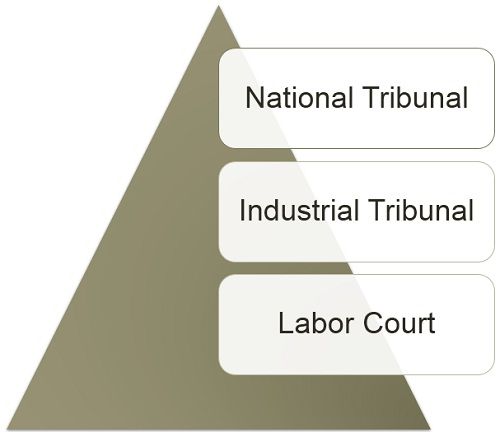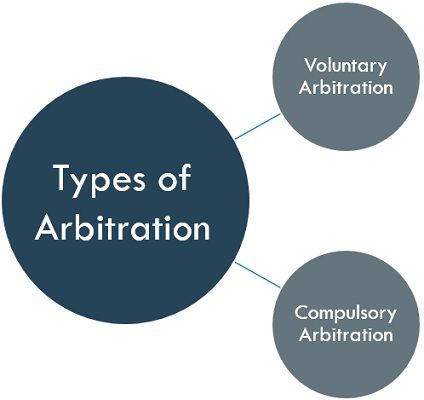 Arbitration is a dispute settlement mechanism in which the dispute is referred to an independent third party by the parties willingly and the third party is empowered to make a decision regarding the conflict situation, which is binding on both parties.
Arbitration is a dispute settlement mechanism in which the dispute is referred to an independent third party by the parties willingly and the third party is empowered to make a decision regarding the conflict situation, which is binding on both parties.
Contrarily, when it is the government which decides to refer the dispute to the court of inquiry as a form of final remedy for out-of-court settlement for the dispute, it is called Adjudication.
Arbitration and Adjudication, both are methods for resolving industrial disputes that involve an independent third party who decides the case, which is binding in nature. As the process of arbitration and adjudication is more or less the same, many often juxtapose the two.
So, in this written material we will discuss all the differences between arbitration and adjudication.
Content: Arbitration Vs Adjudication
Comparison Chart
| Basis for Comparison | Arbitration | Adjudication |
|---|---|---|
| Meaning | Arbitration is a systematic process in which the parties to conflict give their consent to refer the dispute to an independent person, mutually chosen by them for the settlement of the dispute. | Adjudication is the ultimate legal remedy available to settle industrial disputes, often referred to the independent third party by the government. |
| Nature | Voluntary | Compulsory |
| Presiding officer | Arbitrator | Judge or Magistrate or any other appointed official |
| Number of Presiding Officers | One or more | Only one |
| Appointment of assessors | No such facility is available | Assessors can be appointed to advise the Presiding officer |
| Power | Derived from written agreement given by both the parties, to refer the dispute to arbitration. | Derived from the provisions of the Industrial Dispute Act, 1947. |
| Time taken to settle the dispute | It may take months to settle the dispute. | Comparatively less time is taken to settle the dispute. |
Definition of Arbitration
Arbitration can be defined as a systematic process, wherein an independent third party carefully analysis the dispute, listens to the demands of both parties, and then makes a judgment that is enforceable in nature. There exists a specific authority, for resolving industrial disputes under certain circumstances.
Arbitration is adopted when the conciliation fails to resolve the dispute between parties. In this process, the arbitrator assesses the matter, collects information, and after considering all the facts, evidence and witnesses submitted, he/she declares the award or judgment, regarding the dispute.
The arbitrator has the power to decide and regulate the terms of negotiation. And so, even in the deadlock situation, the arbitrator assures a definite solution.
Further, whatever judgment or award given by the arbitrator is submitted to the government, which is published by the government within a period of 30 days. And once it is published, it is ready to be imposed in 30 days. Hence, the parties abide by the decision made by the arbitrator.
Characteristics of Arbitration
- Intervention of Third Party
- Dispute Settlement Mechanism
- Consensual and neutral
- Private Procedure
- Binding in nature
- Decision-based on the Principle of Natural Justice.
- Fast and Economical
Types of Arbitration
- Voluntary Arbitration: As the name suggests, when the parties fail to resolve the conflict on their own or by way of conciliation, they mutually decide to refer the dispute to an impartial third party, who settles the case by granting an award which is binding on both the parties. So, the parties through their mutual consent appoint the arbitrator.
- Compulsory Arbitration: When the decision for referring the dispute to arbitration is decided by the government, without the consent of the parties, it is called compulsory arbitration, or adjudication. This happens when the two parties fail to resolve the dispute voluntarily. In compulsory arbitration, parties are forced to submit their dispute to an outside party, board or court, for settlement.
Merits of Arbitration
- Parties agree to it mutually and its decision is binding and final.
- Rapid and efficient, as regards courts and tribunals.
Demerits of Arbitration
- Expensive, as the money spent in the process, has to be shared by both parties.
- If the arbitrator is not chosen wisely, the judgment becomes arbitrary.
- Redundant arbitration reflects unhealthy Industrial Relations.
Also Read: Difference Between Arbitration and Conciliation
Definition of Adjudication
Adjudication can be defined as the eventual remedy available to the parties under dispute, wherein a third party is appointed by the government for the settlement of the dispute. However, parties in dispute, can also mutually refer the dispute to adjudication.
Now you must be wondering, in spite of having various dispute resolution methods, why there is a need for the imposition of compulsory arbitration or adjudication? Well, the only reason is to maintain industrial peace, so as to ensure smooth functioning of industries, without any stoppages.
Forms of Adjudication
The two forms of adjudication on the basis of nature of reference and nature of award are:
- Compulsory reference but voluntary acceptance of the award.
- Compulsory reference but compulsory acceptance of the award
System of Adjudication
As per Industrial Dispute Act, 1947, there exists a three-tier adjudication system:
Labour Court
Labour court comprises of one presiding officer who has served as a Judge of High Court or as a district judge for a minimum period of 3 years or held any judicial office for a minimum period of 7 years.
Industrial Tribunal
A body comprising of a single presiding officer whose appointment is carried out by the Government. Further, two assessors can be appointed by the government for advising the presiding officer. Its jurisdiction is larger in comparison to the labor court.
National Tribunal
An adjudicatory body with a single presiding officer appointed by the government to handle disputes that might affect industrial units of multiple states and those which are of national importance.
Also Read: Difference Between Arbitration and Litigation
Key Differences Between Arbitration and Adjudication
So far we have talked about the concepts of the two industrial dispute settlement machinery. Now we will discuss the differences between arbitration and adjudication:
- Arbitration is a private but judicial determination of an industrial dispute, wherein there is an independent arbitrator appointed, to resolve the dispute, who gives judgment in the form of an arbitration award which is binding on both. As against, adjudication refers to the legal process to resolve industrial disputes, in which the judge or magistrate reviews all the evidence submitted and listens to the arguments of both the parties, and declares the judgment, which determines the future course of action.
- Arbitration is usually done voluntarily, with the consent of both the parties but it can be undertaken compulsorily wherein government makes it necessary to go for arbitration, without the consent of the parties concerned on the recommendation of the conciliation officer, which is formally known as adjudication. Hence, in the case of arbitration, the parties show their willingness to refer to the arbitrator through an agreement.
- In the case of arbitration, the presiding officer is the arbitrator, whereas, in the case of adjudication, it is the judge, magistrate, or any other appointed judicial officer who presides over the dispute.
- There can be one or more than one arbitrator appointed in case of arbitration. As against, there is only one presiding officer in case of adjudication.
- In adjudication, assessors can be appointed to advise the Presiding officer. However, assessors can be appointed only in the industrial and national tribunal, but not for labor courts to advise the presiding officer, as there is no provision for the appointment of assessors in the case of labor courts. Further, the assessors must be experts in the concerned domain, possessing a thorough knowledge of the issue. Oppositely, no facility to appoint the assessors is available in case of arbitration.
- The power to go for arbitration can be derived from a written agreement given by both parties. Conversely, the power to adjudicate the dispute is derived from the provisions of the Industrial Dispute Act, 1947.
- When it comes to the time taken to settle the dispute, arbitration usually takes more time than adjudication for the settlement of the dispute.
Voluntary Arbitration Machinery
When there is a prolonged dispute between management and workers, they can mutually give their consent to pass the dispute to an arbitrator. For this purpose, an arbitration agreement is created, which states the total number of arbitrators to be appointed, in addition to an Umpire. In this process, Umpire acts as an official who arbitrates, whenever there is a tie during voting. So, his decision prevails.
One copy of the arbitration agreement must be sent to the appropriate government. And prior to the commencement of the arbitration process, it must be published in the Official Gazette by the Government. Voluntary Arbitration is effective because:
- Encourages cordial relationships between parties.
- Fast and uncomplicated
- Creates an environment in which parties can go for friendly negotiation rather than litigation.
Conclusion
While arbitration is one of the modes of dispute settlement, adjudication is the last mode of dispute settlement, when all the other modes, fail to resolve the issue, then this mode is implemented.







Leave a Reply